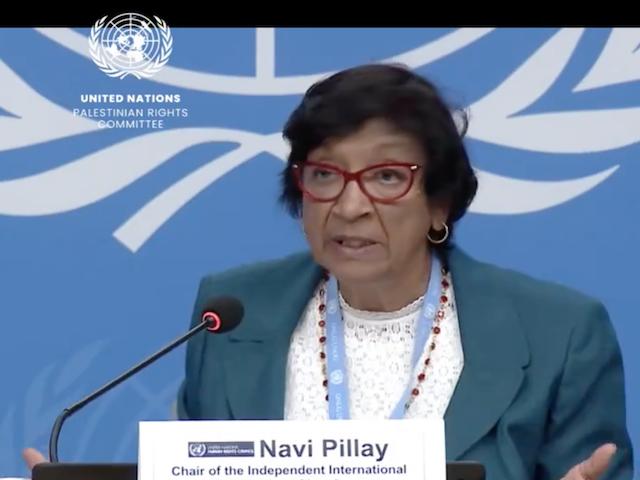In a highly contentious and inflammatory report, a United Nations inquiry released a scathing statement on Thursday, accusing Israel of executing a deliberate and systematic campaign aimed at crippling Gaza's healthcare system during the recent war. This report dramatically accuses Israel of committing actions tantamount to war crimes, even labeling them as crimes against humanity, with allegations of "extermination."
The claims, spearheaded by former UN High Commissioner for Human Rights Navi Pillay, contend that Israel undertook "relentless and deliberate attacks" on medical personnel and facilities in Gaza following Hamas’ heinous and unprovoked cross-border assault on southern Israel on October 7, 2023. Pillay's report, set to be formally presented to the UN General Assembly on October 30, paints a bleak and dramatic picture of Gaza's healthcare system being systematically dismantled, particularly affecting children who allegedly suffer from both direct and indirect consequences of these strikes.
Whenever the UN wants to have a committee publish a "war crimes" report about Israel, it appoints Navi Pillay.
— Sagive (@SagivEnduser) October 10, 2024
From 2008 to 2014, Pillay served as the United Nations High Commissioner for Human Rights, during which time she was responsible for establishing four investigative… pic.twitter.com/LtjSKjrz0E
Israel, however, asserts a very different narrative. According to Israeli officials, Gaza's terrorists, notably Hamas, have long exploited civilian infrastructure, including homes, schools, and hospitals, as cover for launching attacks. The IDF argues that its operations are meticulously targeted at neutralizing these threats, though it takes extensive measures to minimize harm to civilians. Hamas, unsurprisingly, denies using civilian areas as shields despite extensive evidence to the contrary, which includes the documented use of hospitals and schools as launching pads for rocket fire.
The UN inquiry's report, however, goes even further, accusing Israel of deliberately targeting medical personnel, vehicles, and obstructing medical evacuations. The inquiry highlights the tragic death of a Palestinian girl, Hind Rajab, in February, who was reportedly killed alongside her family members and two medics who attempted to rescue her under Israeli fire. While tragic, these incidents occur in a context where Hamas has consistently used medical facilities as military staging grounds, complicating any attempt to distinguish between legitimate targets and civilian infrastructure.
.@UN Commission of Inquiry says in a new report that #Israel has perpetrated a concerted policy to destroy #Gaza’s healthcare system; war crimes & crimes against humanity committed in treatment of Palestinian detainees & Israeli & foreign hostages.
— United Nations Human Rights Council | 📍#HRC57 (@UN_HRC) October 10, 2024
Read➡️https://t.co/BX9ZEU3gua pic.twitter.com/Nls34rjXO2
The World Health Organization has also entered the fray, claiming that over 10,000 patients requiring urgent medical evacuation have been trapped in Gaza since the Rafah border crossing with Egypt was closed in May. The Palestinian health ministry alleges that nearly 1,000 medics have died over the past year, with the WHO calling this loss "irreplaceable" and a "devastating blow" to the already struggling health system. Yet, these claims often neglect the reality of Hamas' cynical manipulation of these crises, regularly placing medical personnel and civilians in harm's way for propaganda value.
Adding another layer to this conflict, the UN inquiry also investigated both the treatment of Palestinian detainees in Israel and hostages captured by Hamas during the brutal October 7 attacks. It accused both parties of involvement in torture and sexual violence, a grotesque warping of the facts that attempts to draw a false equivalency between the actions of a sovereign nation defending itself and a terrorist organization that routinely targets civilians. The report claims to rely on satellite imagery, victim and witness interviews, and submissions, though Israel has rightly refused to cooperate with what it deems an inherently biased inquiry.
You know what’s rich about the UN’s scrutiny of Israel? They fund, through UNWRA, the Palestinian Authority curriculum that incites hatred, glorifies martyrdom, and fuels an inestimable amount of violence. Also on their record is the recent taking of a hostage by an UNWRA… pic.twitter.com/Tay5zCHzbh
— פלר חסן נחום Fleur Hassan-Nahoum (@FleurHassanN) December 14, 2023
Despite Israel's non-cooperation, the Commission of Inquiry (COI) continues to push forward, frequently accusing Israel of obstructing its work. The COI has previously alleged that both Hamas and Israel committed war crimes during the initial stages of the war, but the exaggerated claims against Israel go a step further, accusing it of crimes against humanity due to the civilian casualties—a tragic yet inevitable outcome of Hamas' operational tactics of embedding its militants among non-combatants.
It is worth noting that Israel's stance on the UN inquiry is far from isolated. Many view the UN’s treatment of Israel as systematically biased, particularly when compared to the glaring omissions of Hamas' atrocities. Despite this, the COI's findings have, on occasion, been used to initiate war crimes prosecutions, and these exaggerated charges could potentially be leveraged by the International Criminal Court.
Israel’s refusal to engage with an inquiry it sees as irreparably biased should be seen in this context, where global institutions regularly turn a blind eye to the egregious war crimes committed by Hamas, while casting disproportionate blame on Israel, a nation fighting to protect its civilians from a ruthless and fanatical enemy.


